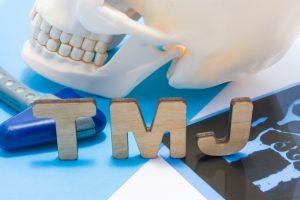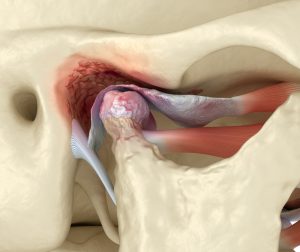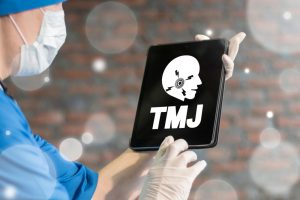Jaw Pain Mysteries: Are You Silently Suffering?
At Sac Sleep & Breathing, Dr. Scott Grivas understands that chronic jaw pain, often associated with TMJ dysfunction, is more than just a nuisance—it’s a complex puzzle affecting residents of Sacramento, Rio Linda, Rancho Cordova, and Citrus Heights, CA.
As a leading Sacramento TMJ dentist, Dr. Grivas has dedicated his practice to unraveling the intricate web of temporomandibular joint (TMJ) disorders that leave countless patients searching for relief. Learn more about the many causes of TMJ disorder, and how Dr. Grivas can help you overcome it despite the source by calling our Sacramento sleep center at (916) 735-4060.
What Is TMJ Disorder?
The temporomandibular joint is a sophisticated hinge connecting your jawbone to your skull. Unlike other joints in the body, this complex mechanism allows for intricate jaw movements like chewing, speaking, and yawning. The temporomandibular joints are the anatomical structures involved in TMJ disorders. When something goes wrong, it results in TMJ disorder also known as temporomandibular disorder or temporomandibular joint dysfunction, and the ripple effects can be profound, causing pain that extends far beyond the jaw.
Are you experiencing unexplained jaw and facial pain now? Call Dr. Grivas at (916) 735-4060 for a comprehensive evaluation!
Root Causes of TMJ & How They Trigger TMJ Disorders
Bruxism (Teeth Grinding)
Chronic teeth grinding or clenching, known as bruxism, is a significant contributor to TMJ disorders. This repetitive action places excessive stress on the temporomandibular joint, leading to inflammation, pain, and potential structural damage. Bruxism also affects the chewing muscles, causing pain and spasms.
Over time, the constant pressure can wear down tooth enamel, alter jaw alignment, and cause muscle fatigue in the jaw area. Nighttime bruxism is particularly problematic as it often goes unnoticed, allowing the damage to accumulate over extended periods.
Genetic Predispositions
There are several genes associated with increased risk, including HTR2A, COMT, and ESR1. These genetic variations can affect jaw structure, connective tissue characteristics, and pain perception. Individuals with family histories of joint hypermobility or autoimmune disorders may have a higher likelihood of developing TMJ issues due to inherited traits that impact joint stability and immune system function.
Stress and Psychological Factors
Stress often manifests physically as muscle tension, particularly in the jaw and neck areas. This tension can lead to habitual jaw clenching and teeth grinding, exacerbating TMJ symptoms. Stress can also affect the muscles that control jaw movement, leading to pain and stiffness.
Anxiety and depression have been linked to increased muscle activity in the jaw, potentially triggering or worsening TMJ pain. The relationship between stress and TMJ disorders is bidirectional, with each condition potentially exacerbating the other.
Physical Trauma and Injury
Impacts from accidents, sports injuries, or even seemingly minor traumas can disrupt the delicate balance of the temporomandibular joint. Whiplash, in particular, can cause misalignment and damage to the joint structures.
These injuries may not immediately manifest as TMJ disorders but can lead to gradual deterioration of joint function over time, resulting in pain, restricted movement, and other TMJ symptoms months or even years after the initial trauma.
Dental Misalignment and Bite Issues
Malocclusion, or improper bite alignment, is a significant factor in TMJ disorders. When teeth don’t fit together correctly, it forces the jaw into unnatural positions, creating uneven pressure on the temporomandibular joint. This misalignment can cause the jaw muscles to work harder, leading to fatigue and strain.
Over time, the constant stress on the joint can result in wear and tear, inflammation, and potential structural changes. Conditions such as overbites, underbites, and crossbites can all contribute to the development of TMJ disorders.
Arthritis and Inflammatory Conditions
Inflammatory conditions, particularly arthritis, can severely impact TMJ health. Rheumatoid arthritis and osteoarthritis can directly affect the temporomandibular joint, causing cartilage breakdown, reduced joint lubrication, and chronic pain.
These conditions can lead to changes in jaw joint structure and function, potentially resulting in limited jaw movement and persistent discomfort. The inflammatory processes associated with these conditions can exacerbate TMJ symptoms and accelerate joint degeneration. Nonsteroidal anti-inflammatory drugs (NSAIDs) like ibuprofen and naproxen can help alleviate pain and swelling associated with these inflammatory conditions.
Disk Erosion or Displacement
When the articular disk erodes or becomes displaced, it can lead to significant TMJ issues. Disk problems can cause pain, clicking or popping sounds during jaw movement, and restricted jaw mobility.
The displacement can result from trauma, chronic inflammation, or structural abnormalities. As the condition progresses, it can lead to further joint damage and more severe TMJ symptoms, potentially requiring advanced interventions to restore proper joint function.
Hormonal Influences on TMJ Health
Hormonal changes play a critical role in TMJ disorder development, particularly for women. Estrogen fluctuations during menstrual cycles, pregnancy, and menopause can significantly impact joint stability and pain sensitivity.
These hormonal shifts can increase joint inflammation, alter pain perception, and potentially exacerbate existing TMJ symptoms. Understanding the hormonal connection helps explain why women are more frequently diagnosed with TMJ disorders.
Nutritional Factors and Joint Wellness
Proper nutrition is essential in managing and preventing TMJ disorders. Vitamin D, calcium, and magnesium are crucial for maintaining joint health and reducing inflammation. Deficiencies in these nutrients can weaken joint structures and increase susceptibility to TMJ complications.
Vitamin C supports collagen production, while B vitamins help manage inflammation and support nerve health. A comprehensive nutritional approach can be a powerful tool in TMJ management. Patients are also advised to eat soft foods like yogurt and mashed potatoes to reduce stress on the jaw.
Sleep Disorders and TMJ Connection
Sleep-related issues have a profound impact on TMJ health. Conditions like sleep apnea and chronic insomnia can contribute to increased jaw tension and bruxism. Poor sleep quality often leads to unconscious jaw clenching and teeth grinding, which can cause significant stress on the temporomandibular joint. Addressing underlying sleep disorders can be a crucial step in managing and preventing TMJ complications.
Postural in TMJ Health
Body posture plays a significant role in TMJ disorder development. Forward head posture, common in today’s digital age, can misalign the jaw and create uneven stress on the temporomandibular joint. Prolonged desk work, smartphone use, and poor ergonomics can contribute to muscle imbalances that affect jaw function. Incorporating posture correction and ergonomic improvements can help mitigate TMJ-related issues.
Possible Treatments For TMJ in Sacramento, CA
Dr. Scott Grivas offers a range of personalized treatments for temporomandibular disorders, tailored to address specific causes. These treatments are designed to address the specific causes of TMJ dysfunction:
Vivos Appliance Treatment
The Vivos Appliance is particularly effective for TMJ issues caused by:
- Dental Misalignment: By restructuring jaw alignment, it corrects overbites, underbites, and crossbites that contribute to TMJ disorders.
- Bruxism: The appliance helps reposition the jaw, reducing stress from teeth grinding and clenching.
- Genetic Predispositions: For patients with inherited jaw structures prone to TMJ issues, the Vivos Appliance can provide long-term realignment.
Custom Nightguards
Custom nightguards are beneficial for:
- Bruxism: They create a protective barrier between upper and lower teeth, preventing damage from nighttime grinding.
- Stress-Related TMJ: For patients whose TMJ is exacerbated by stress-induced clenching, nightguards offer protection during sleep.
Physical Therapy Collaboration 
Dr. Grivas works with specialized physical therapists to address:
- Physical Trauma: Targeted exercises and manual therapy can help realign the jaw after accidents or injuries.
- Muscle Tension: Physical therapy techniques can relax overworked jaw muscles, reducing pain and improving function.
Outpatient Interventions
Dr. Grivas may recommend outpatient interventions for more severe cases such as:
- Arthritis-Related TMJ: Minimally invasive procedures to reduce inflammation and improve joint mobility.
- Disk Erosion or Displacement: Carefully considered interventions to address internal joint issues without resorting to major surgery.
Comprehensive Approach
Dr. Grivas combines these treatments with:
- Stress Management Techniques: To address psychological factors contributing to TMJ disorders.
- Nutritional Guidance: To support overall joint health and reduce inflammation.
- Sleep Disorder Treatment: Addressing related conditions like sleep apnea that may exacerbate TMJ symptoms.
By tailoring these treatments to each patient’s specific TMJ cause, Dr. Grivas provides a comprehensive solution that goes beyond symptom management to address the root of the problem.
Why Patients Choose Dr. Grivas For TMJ Treatment!
Dr. Grivas offers comprehensive TMJ treatment for Sacramento area residents, addressing the complex temporomandibular joint disorders that cause significant pain and discomfort. His approach recognizes multiple root causes including bruxism, genetic predispositions, stress, physical trauma, dental misalignment, arthritis, and disk displacement.
Using innovative techniques like the Vivos Appliance and custom nightguards, Dr. Grivas provides personalized solutions that go beyond traditional pain management. By collaborating with physical therapists and employing advanced diagnostic techniques, he develops tailored treatment plans that address both symptoms and underlying causes of TMJ disorders. Patients experiencing jaw pain can find pain relief through his specialized care, which focuses on comprehensive rehabilitation and least-invasive interventions.
Call Sac Sleep & Breathing by dialing (916) 735-4060 for immediate relief.
Frequently Asked Questions
Can TMJ disorders resolve naturally?
Some mild TMJ issues might improve with lifestyle changes, self-care, and relaxation techniques. However, most TMJ disorders require professional intervention to prevent progression and manage symptoms effectively. Professional diagnosis from a specialized TMJ dentist like Dr. Grivas ensures comprehensive treatment that addresses the root causes of your specific TMJ condition.
Are TMJ treatments covered by insurance?
Insurance coverage for TMJ treatments varies widely depending on your specific plan and the underlying cause of the disorder. Dr. Grivas’s team can help you navigate the complexities of insurance coverage and identify potential reimbursement options for your treatment. They will work closely with you to explore affordable solutions and maximize your insurance benefits for TMJ care.
How long does TMJ treatment take?
Treatment duration depends on the complexity of the individual TMJ disorder and the specific underlying causes. Some patients may experience significant relief within weeks of starting treatment, while others with severe symptoms might require several months of comprehensive care. Dr. Grivas develops personalized treatment plans that are tailored to each patient’s unique condition, ensuring the most efficient path to recovery.
Is surgery always necessary?
Surgery is typically considered a last resort for TMJ disorders after conservative treatments have been exhausted. Dr. Grivas prioritizes non-invasive approaches such as appliance therapy, physical interventions, and lifestyle modifications to address TMJ issues. Only in rare, severe cases that do not respond to other treatments will surgical options be carefully considered and discussed with the patient.
Your Path to Relief Starts Now, Call Dr. Grivas Today!
Residents of Sacramento, Rio Linda, Rancho Cordova, and Citrus Heights – your jaw pain doesn’t define you. Dr. Grivas and the Sac Sleep & Breathing team are committed to transforming your quality of life. One phone call can be the first step towards understanding and healing your TMJ disorder. Break free from jaw pain! Contact our Sacramento dentist at (916) 735-4060 and reclaim your comfort today.
